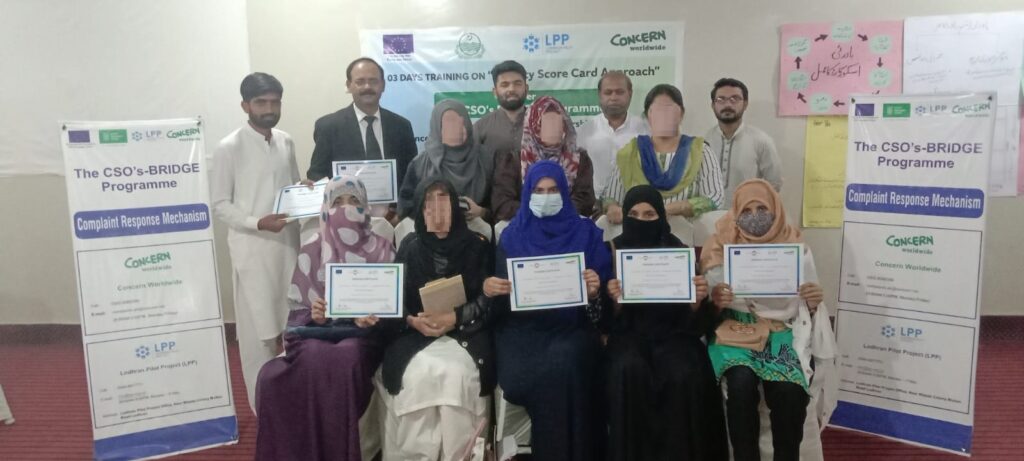Introduction:
Addressing poverty and promoting sustainable development requires the collective effort of dedicated professionals equipped with the right knowledge and tools. In a significant step towards enhancing their capabilities, the AHSSAS team recently completed an intensive training program on the Poverty Score Card. This comprehensive training equips the team with the necessary skills to effectively assess poverty levels, identify vulnerable groups, and provide data-driven recommendations for impactful policy interventions. In this blog post, we celebrate the achievement of the AHSSAS team and explore the importance of their training in the context of poverty alleviation.
Enhancing Expertise through Training:
The completion of the Poverty Score Card training represents a significant milestone for the AHSSAS team. The training program aimed to deepen their understanding of poverty dynamics, familiarize them with the indicators used in the score card, and develop their ability to analyze and interpret poverty data accurately. Through a combination of theoretical sessions, practical exercises, and case studies, the AHSSAS team gained valuable insights and hands-on experience in using the Poverty Score Card as a powerful tool for assessing poverty and formulating evidence-based policy recommendations.
Benefits of Training Completion:
- Robust Data Analysis: The AHSSAS team now possesses the expertise to collect, analyze, and interpret poverty data using the Poverty Score Card methodology. They have acquired a comprehensive understanding of the multidimensional nature of poverty and can utilize statistical techniques to generate meaningful insights from complex datasets.
- Targeted Interventions: Equipped with the knowledge gained from the training, the AHSSAS team can identify vulnerable groups and pinpoint the key drivers of poverty within a population. This enables them to propose targeted interventions and policies that address the specific needs and challenges faced by marginalized individuals and communities.
- Evidence-based Decision-making: The training empowers the AHSSAS team to make evidence-based decisions when formulating poverty alleviation strategies. By leveraging the insights derived from the Poverty Score Card, they can provide policymakers with accurate and up-to-date information, fostering a more effective and informed approach to poverty reduction.
- Monitoring and Evaluation: The AHSSAS team’s enhanced expertise in utilizing the Poverty Score Card enables them to play a vital role in monitoring and evaluating the impact of poverty alleviation initiatives. They can track progress, identify gaps, and propose necessary adjustments to ensure that poverty reduction efforts remain on track.
Celebrating Achievement: Certificate Distribution Event
To commemorate the successful completion of the Poverty Score Card training, the AHSSAS team recently held a certificate distribution event. The ceremony recognized the team’s dedication, hard work, and commitment to expanding their knowledge and skills in the field of poverty assessment. The event served as a platform for acknowledging their achievements, sharing experiences, and reinforcing their role as key players in poverty alleviation efforts.
Looking Ahead:
The completion of the Poverty Score Card training represents a significant milestone for the AHSSAS team. Equipped with enhanced expertise, they are well-positioned to make meaningful contributions towards poverty reduction. By leveraging the insights gained from the Poverty Score Card, the AHSSAS team can play a crucial role in formulating evidence-based policies, targeting resources effectively, and monitoring progress towards sustainable development goals.
Conclusion:
The completion of the Poverty Score Card training by the AHSSAS team marks an important achievement in their journey towards effective poverty alleviation. Equipped with enhanced expertise and a comprehensive understanding of poverty dynamics, the team is now better equipped to assess poverty levels, identify vulnerable groups, and propose targeted policy interventions. Their training completion sets the stage for evidence-based decision-making, targeted resource allocation, and continuous monitoring of poverty reduction efforts. As the AHSSAS team continues to make a positive impact,
we can look forward to a future where poverty is systematically addressed, and the most vulnerable populations receive the support they need to overcome the challenges they face. With the AHSSAS team’s expertise in utilizing the Poverty Score Card, policymakers can make informed decisions, allocate resources effectively, and implement policies that create lasting positive change.
Furthermore, the AHSSAS team’s completion of the training highlights their commitment to professional development and their dedication to improving the lives of individuals and communities affected by poverty. It showcases their proactive approach to staying abreast of the latest methodologies and best practices in poverty assessment, ensuring that their work remains relevant and impactful.
As we move forward, it is essential to recognize the AHSSAS team’s role as change agents in poverty alleviation. Their expertise and dedication will contribute significantly to shaping comprehensive strategies, identifying innovative solutions, and fostering collaboration among stakeholders. By harnessing the power of the Poverty Score Card and other effective tools, we can create a future where poverty is no longer a barrier to people realizing their full potential.
In conclusion, the completion of the Poverty Score Card training by the AHSSAS team signifies a significant step towards strengthening their expertise in poverty assessment and policy formulation. It paves the way for evidence-based decision-making, targeted interventions, and continuous progress monitoring. With their enhanced skills and commitment to making a difference, the AHSSAS team is poised to contribute significantly to the global fight against poverty, leading us closer to a future where socioeconomic disparities are minimized, and opportunities for prosperity are accessible to all.

